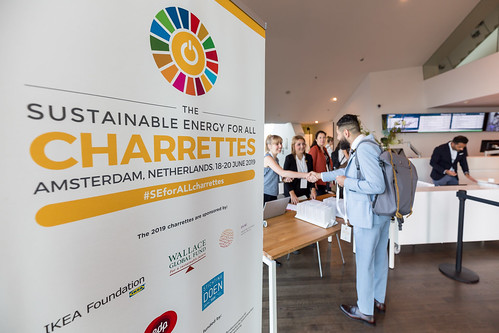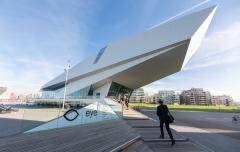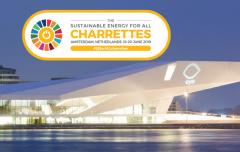Recapping the SEforALL Charrettes: Intensive, Collaborative and Disruptive
Participants at last week’s Sustainable Energy for All (SEforALL) Charrettes were greeted with a piercing message from Rachel Kyte, CEO and Special Representative of the UN Secretary-General for Sustainable Energy for All.
“We can’t keep on having the same conversation amongst the same people asking the same questions and expecting something transformative to happen,” said Kyte, during the event’s opening session. “You are here for a reason.”
That reason was to generate new ideas for achieving Sustainable Development Goal 7 (SDG7) for access to clean, affordable, reliable and sustainable energy for all by 2030. Recognizing a clear lack of progress towards SDG7, as evidenced in the latest Tracking SDG7: The Energy Progress Report 2019, SEforALL held the Charrettes to catalyze disruptive solutions in the areas of access to electricity and clean cooking.
The SEforALL Charrettes were not your typical conference or workshop. Instead, a purposeful list of participants from diverse backgrounds was invited to participate in intensive, two-day interactive sessions, with each charrette focused on a different issue on the critical path to delivering SDG7.
“This approach is less about people offloading their knowledge and actually trying to find a different solution,” explained Nthabiseng Mosia, Co-founder of Easy Solar. “Sometimes, to be honest, these conferences can be the same rhetoric over and over again, and I like that this is trying to challenge the status quo.”
Each of the four Charrettes involved approximately 30 participants being led by a professional facilitator employing design-thinking methods to tease out their creativity and collective insights. The four issues interrogated were:
- Data and Evidence - How do we improve data on the 840 million people who still do not have access to electricity, on who and where they are, what they need, what is working and why, to inform decision-making?
- Bridging the Gap – What is required to bridge the gap between the supply of finance committed for electricity access in countries with large access deficits and the demand for such finance?
- Last Mile - What changes are needed within the finance sector, including development finance, to increase its risk appetite to fund market-based last-mile electricity access?
- Clean Cooking – What is required to create a sustainable, investable, private sector-led market for fuels for clean cooking?
During the two days of design-thinking sessions, participants were forced out of their comfort zone, needing to reconcile diverging views and specializations for the sake of converging on the most impactful solutions.
“People are feeling a bit uncomfortable, which I think is very good, because if you want people to think differently it’s really important to get them out of some of their usual modes of working together,” said Eric Wanless, Principal at Rocky Mountain Institute, following the first day of the Charrettes.
Throughout the process, the facilitators kept participants focused on the end goal: the need to find common ground and have two or three disruptive solutions, along with an initial action plan for their implementation, developed by the end of day two. And all four charrettes delivered just that.
Each group presented their solutions and initial action plan in the closing plenary, with some common themes emerging:
- We need to focus on the bottom up to ensure precise needs are better met and to inform market participants and policy makers. Then we need platforms and mechanisms that ensure the bottom up and the top down meet.
- We need to build collaborative platforms to allow different stakeholders to come together and have access to the same body of evidence for decision-making.
- We need to overcome fragmentation in funding, so markets can grow at speed and scale, and for the last mile to be wrapped up in this progress. There was rich feedback for development finance, including multilateral development banks and development finance institutions as well as philanthropy and impact investors.
- We need to view energy as a public good that provides the means for achieving other development priorities. As such, shifting the understanding of energy so that it receives its share of public investment is essential. Better evidence of its role, the returns on investment and the ways in which public investment can be most effective are needed urgently.
At least one of these themes was observed in each of the solutions developed by participants. Among others, the disruptive solutions included a $1 billion clean cooking market accelerator; an open and comprehensive data and evidence platform; powering critical services such as health and education to reach the last mile; and a first-loss fund capitalized by impact investors and commercial finance.
Follow-through on the next steps for implementing the solutions has already begun, with many participants forming working groups to drive their ideas forward.
“We had a great group who were willing to commit to this idea, so we have a list of people who have written down their names and said that they will work with us to participate and make this happen,” said Amar Inamdar, Managing Director of KawiSafi Ventures, who participated in the Last-Mile charrette.
The outcomes of the Charrettes will be captured in a report to be published in the coming weeks. The report will highlight the disruptive solutions and next steps for taking those forward. SEforALL will continue working and supporting partners to implement the solutions over the coming weeks and months, including delivering messages from the Charrettes to the UN Secretary-General’s Climate Action Summit in September.



